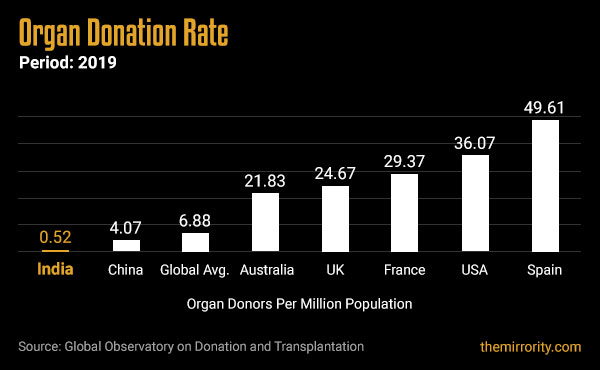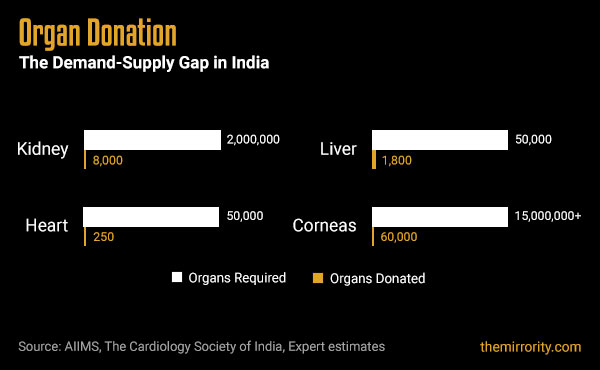
Life is not always fair and often deals a hard hand to some. Many people experience end-stage organ failure in their lives for which organ transplants serve as their only hope. Organ transplant is a medical procedure where an organ removed from a donor is placed in the body of the recipient. A single deceased donor can give the gift of life to 6 recipients through the donation of his vital organs like heart, pancreas, liver, kidneys, lungs, and eyes. Organ donation is truly one of the greatest boons of modern medicine and aptly called the ‘gift of life’
Despite all its blessings, Indians are far more reluctant in donating their organs compared to other countries. In India, 5 lakh people die every year waiting to receive an organ transplant.

In 2019, the rate of deceased organ donations in India was only 0.52 per million population (pmp). In comparison, the organ donation rate in the USA was 36.07 pmp, 49.61 in Spain, 24.67 in the UK, 21.83 in Australia, 29.37 in France, 4.07 in China, and 6.88 globally.

The wait for receiving a transplant in India is often 18-20 years long which includes daily servings of physical pain and soul-crushing hope. The number of organs required to save lives is far lesser than is available. Over 2,00,000 patients annually need kidney transplants but only 8,000 transplants can actually take place, for the 50,000 patients in need of heart transplants there are only 250 donors, only 1,800 liver donors are available for the 50,000 patients requiring liver transplants, a measly 60,000 corneas are donated annually against the 15,00,000+ patients on the waiting list.
Why do Indians abstain from donating their organs
The frighteningly low levels of organ donation in India are primarily due to religious beliefs.
Hindus, which comprise over 80% of India’s demographic, believe in the practice of antyesti, which literally means “last sacrifice” and which forms the last of the 16 rites of passage or samskara. This practice is also commonly referred to as antim sanskar.

As per the texts in Rigvedas, the Hindus believe that the human body and the universe consist of five elements – air, water, fire, earth, and space. The antim sanskar returns the mortal remains (body) of the dead to the five elements while the soul remains immortal. As per the rituals, the corpse of the deceased is placed on a funeral pyre which is lit by the eldest son or a male member of the family. There is an earnest attempt by the family to conduct the antim sanskar within 24 hours so that the soul of the deceased can begin its journey to its next destination. While Hindus perform cremation, Muslims and Catholics bury their dead, mostly within the 24 hours period.
Based on the religious customs practiced for centuries, it is often considered sacrilege to “cut open” the body and give away its various organs. As a result, a deceased person doesn’t die alone but with him die at least 6 other individuals whose lives could be saved using his various organs such as the heart, liver, kidneys unless they are lucky enough to find a donor. Prospective recipients also remain devoid of the pleasure of experiencing nature’s beauty as the donor’s pair of eyes that could help them see are shut forever. Religious experts across all faiths remain unanimous in their understanding that no religious law prohibits their followers from donating their organs and tissues. However, less than 1% of India’s population is willing to consider giving this gift of life to others.
The other big issue is that of awareness. Only a fraction of the individuals are aware of the practice and life-saving miracles of organ donation. For those that are aware, there is no proper knowledge of the process involved and hence they abstain from registering themselves for organ donation.
No wonder then that over 92% of all transplants performed in the country have been with organs donated from living donors and only 8% from deceased donors. It is estimated that if the rate of donation by deceased persons were to increase to 1 per million population, it would meet the requirements for all heart, liver, and majority of kidney transplants in the country.
Laws and government efforts
In India, organ donation is regulated by the Transplantation of Human Organs and Tissues Act, 1994. The law allows both deceased and living donors to donate their organs. It also identifies brain death as a form of death. In 2019, the Government of India implemented the National Organ Transplant Programme with a budget of ₹150 crores (US$20 million) for promoting deceased organ donation.
While there is a central law, most state governments have come up with local laws and frameworks to further promote organ donation within their respective states. The Andhra Pradesh government enacted the Transplantation of Human Organs Act, 1995 and their deceased donor program (called Jeevandaan) helped it achieve one of the highest organ donation rates amongst all states in India. In 2008, the Government of Tamil Nadu made brain death certification mandatory in the state and established the Cadaver Transplant Programme, important steps due to which the state has the highest organ donation rates in India, almost 3 times the national average. The Madhya Pradesh government created multiple green corridors (a route that is cleared out for an ambulance carrying the harvested organs such as heart and liver which have a preservation time of under 12 hours) to ensure its delivery at the destination in the shortest time possible.
While central and state governments in India have created laws to promote and facilitate organ donation, its implementation is often found lacking. Most cities yet do not have the required infrastructure in the form of hospitals and specialists to quickly respond to a call for organ extraction and transplantation. Only a few metropolitan cities such as Mumbai, Delhi, Bangalore have comparatively better infrastructure facilities.
At a global level, World Organ Donation Day is marked on the 13th of August every year to raise awareness about organ donation. Some progressive countries such as the UK have amended their laws to automatically register all citizens as organ donors unless they specifically opt-out. It is time the Indian government considers amending its semi-beneficial laws and provide a right of life to all its citizens.
Government laws, however strong, will alone not achieve the desired effect. All pillars of society need to adopt a coordinated and concerted effort to promote organ donation. The nonprofit organizations, community-based organizations, and faith-based organizations need to convince people to unchain themselves from ancient religious customs and answer a higher religious and moral calling of helping humanity by donating their organs. Educational institutions such as schools and colleges need to include literature on organ donation as part of their curriculum to increase awareness with the same zeal as it is trying to educate children about India’s history and political leaders. The undergraduate medical curriculum should be improvised to provide students with basic information on procedures and ethical issues concerning organ transplantation and donation so that future doctors can become informed advocates of organ donation. Media and sports celebrities need to staunchly adopt and promote this noble act amongst their legion of followers than just provide lip service for personal image building. Lastly, we as individuals need to register for organ donation and become a role model for our children and our circle of friends. Because - if not us, then who and if not now, then when?
Who can become an organ donor
Living donors, over 18 years of age, can donate one of their kidneys, portion of their pancreas, and part of their liver only to their immediate blood relatives.
Deceased donors may donate six life-saving organs (liver, heart, both kidneys, both lungs, pancreas, and intestine) in addition to tissues (cornea, skin, heart valves, bone, blood vessels, and connective tissue) which will be transplanted onto the first person on the waiting list. If the deceased was not previously registered for organ donation, family members of a deceased person can also provide consent for organ donation.
Organs and tissues from a person declared legally dead (brain dead) can be donated after consent from the family has been obtained. In case of brain death, the brain stops working but all other organs are functional and can be kept alive through artificial means till it is retrieved for donation.
How to become an organ donor
In India, the National Organ and Tissue Transplant Organisation (NOTTO) functions as the apex body for activities relating to procurement, allotment, and distribution of organs in the country.
Registering as an Organ donor is a simple two-step process:
- Take a pledge for Organ donation and register yourself as a potential Donor at NOTTO. The website also has a comprehensive FAQ page where answers to most of your doubts regarding organ donation can be found.
- Upon successful registration, you will be allocated a Donor card with a unique registration number. It is advisable to always keep your Donor card on you for ease and timely execution of due procedures.

Donor cards are not a legally binding document as it is only an expression of a person’s willingness to be a donor. According to Indian law, your family member or your next of kin will decide whether to donate your organs or not upon your death. Therefore, it is extremely important that you consult with your family before making a pledge to enable them to respectfully carry out your wishes when the need arises. If for some reason you change your mind later, you can visit the NOTTO website and avail of the un-pledge option by logging into your account.
There are many other NGOs and state-level organizations too where you can take a pledge and receive a Donor card. If you have already pledged with one organisation and received a Donor Card, you need not register with any other organisation as pledges done with any organization are registered with NOTTO.
TO READ THE FULL ARTICLE

Get full access to the exciting content on The Mirrority by logging in
Support independent journalism
Even the very best of media houses in our country today are yielding to the pressure of click-bait journalism in order to survive. More than ever before, our country needs journalism that is independent, fair and non-pliant to the bureaucracy. Such journalism needs the support of like-minded readers like you to help us survive editorially and financially.
Whether you live in India or India lives inside you, help us continue to produce quality journalism with your contribution.
CONTRIBUTE
